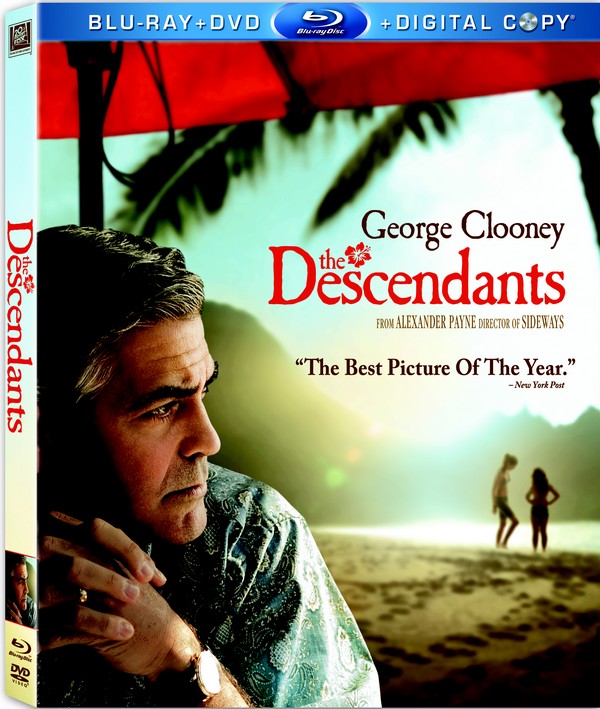The Descendants review by Jackass Tom
The Descendents is a film about legacies and maintaining them.
In the films foreground there is the legacy Elizabeth King. We see her in the opening 20 seconds of the film. The camera is focused on her face, enjoying life with wind and wake in her face just before she is about to be fatally injured. For the rest of the film we never see her in motion, never hear her voice. Her legacy/past is discussed by friends and relatives. We see photos of her beautiful and happy and vibrant. Trophies are displayed of her accomplishments in various rooms. What is left of her is a shell of a person sitting in a hospital bed, mouth open and closer to dead than alive.
Her husband Matt (George Clooney) takes care of preparations; hospital and eventually funeral. Elizabeth’s legacy as a loving mother and wife are compromised when Matt learns that up until her dying days she was having an affair with a stranger named Brian Speer (Matthew Lillard). King and his two daughters spend most of the movie trying to learn about Speer in an effort to understand why Elizabeth was with this man.
In the background there is an equally (if not more) interesting story about legacy. The King family (a name that defines the high water mark of legacy) descends from a long line of Hawaiian royalty and while Matt is trying to understand his wife’s hidden life he also has a decision to make about a large plot of land. He and his cousins stand to make a lot of money off the land if Matt decides to ok a sale. A good number of his cousins are depending on this sale to fix their economic issues and a few would rather keep the land in its current, untouched state. The sale is so big that it’s in the Hawaiian press and everyone on the streets has an opinion. Through this potential sale, however, this beautiful piece of untouched Hawaiian land the King family would cease to maintain any sort of Hawaiian legacy. The idea of being a king is landownership; they might as well be selling their last name along with this valuable plot of land.
Director Alexander Payne moves the film towards maintaining both legacies. Matt’s purpose towards finding the man his wife had an affair with is merely for his own closure. He doesn’t want revenge; he just wants to know more answers about the side of his wife he didn’t know and about where he may have went wrong. In the end her ashes are scattered in the waters where she raced boats. No word of her elicit affairs are ever mentioned to those who didn’t know, most importantly to her father who takes grumpy-man shots at Matt every chance he gets.
As for the land, despite driving a a spike through his family, Matt decides not to sell the land (at least for now). No explicit reason seems to be given. But if you look at the film in terms of legacy it becomes clearer. King’s bond with his daughters (next generation) grows stronger during the film. At one point they even visit the plot of land which looks like it should be a national park. Keeping the land in the family name means he can pass it down to them and let them make their own decision with it. It means they might have the same experiences he once had on that land.
Payne’s direction and touches are in line with his other films. There is a natural feel in his movies that isn’t present in most mainstream films. In previous films, he tends to cast what appear to be non-acting locals to play smaller parts. He also casts realistic, non-Hollywood types in main roles (for example Jack Nicholson’s wife in About Schmidt). The same is the case here. Elizabeth, despite her beauty, was never shown to the camera as a Hollywood plastic model. Beau Bridges plays a cousin/surfer bum of King. King’s youngest daughter is chubby and slightly awkward. Countless other roles are rough around the edges when compared to standard Hollywood perfrection. The film itself isn’t perfection or Payne’s best work but its still Payne’s work which essentially means its better than most films out there. Its strongly constructed, well written, and its feeling of naturalism give the film a strength not often seen in today’s cinema.








8 out of 10 Jackasses blog comments powered by Disqus
Search
The Descendants

IMDB Link: The Descendants
DVD Relase Date: 2012-03-19
DVD Aspect Ratio: 2.35:1
DVD Extras: Deleted scenes, Behind the scenes features, The World Parada-Silent film